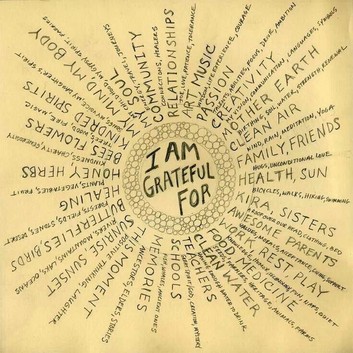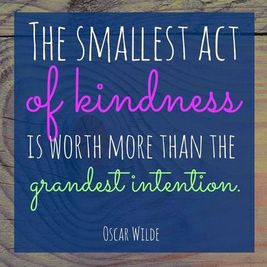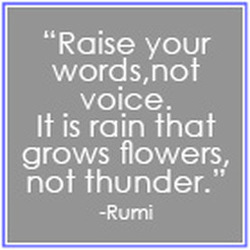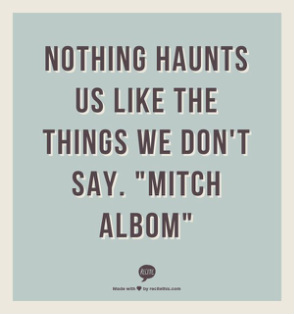 How fluent are you in the language of appreciation? In our "do more" and "be more productive" culture, often times, learning appreciation and gratitude is a muscle that most of us haven't been encouraged to develop. But, appreciation simply defined as the recognition of the good qualities of someone (or something), and gratitude broadly defined as the appreciation of what is valuable and meaningful to you, can make the difference between a relationship filled with headaches and one that's filled will peace. But, it's not just a simple "thank you" that will change your relationships. The type of appreciation I'm talking about here is the kind that opens you up to see and comment on another person's strengths in a genuine, caring, and respectful way. What's more, a number of early research suggests that expressing gratitude, thankfulness, and appreciation to your child, colleague, partner, etc., can create positive feelings, which in turn, contribute to your overall sense of well being and life satisfaction. (1) So what are a few simple steps you can take to increase appreciation in your relationships? 1. Start with yourself. Take a few moments each day and create a list of things in your life for which you are grateful. Maybe, it's your family, your dog, the food you eat, or your job. Don't overthink it. Just write. Another action you might try is to take a few minutes at the end of each day to ask yourself: “What did I do that I can feel satisfied with today?” 2. Appreciate others. Notice what your partner, children, friends, colleagues do well. Think of what you appreciate and just say it to them out loud. Another action might be to write a thank you note to someone, or send a letter to someone you recognize as valuable in your life. The more specific you can be about what you value, the more positive your impact on that person may be. Lastly, practice saying "thank you" to your grocery clerk, bank teller, or restaurant server, and just observe the response you receive in return. 1. Gratitute and Well-being. Pyschiatry (Edgemont). 2010 November; 7 (11)18-22. - Learn more about WVC Therapist, Appointments and Counseling Fees. image via nurture nature project
1 Comment
 1. Say "Good morning" to your partner before you get out of bed. 2. Buy a cup of coffee for the person in line behind you. 3. Say, "I love you" to someone you love. 4. Write a simple one sentence note of appreciation to a family member ("thanks for taking out the garbage"). Leave it on a post it in an unexpected place someone they will find. like the bathroom mirror. 5. Offer to assist an elderly neighbor by walking their pet or picking up groceries at the store. 6. Leave cookies in the office kitchen. 7. Write a letter to yourself and highlight five of your talents. 8. Take old old clothes to the Goodwill in your neighborhood.. 9. Say "hello" to five strangers today. Look for opportunities at the grocery store, bank, restaraunt, coffee shop, office, and school. 10.. Compliment someone! - Learn more about WVC Therapist, Appointments and Counseling Fees.  It's safe to say that conflict is inevitable in any relationship. But, for many couples learning how to respectfully resolve conflict can be a bit more challenging. For example, when couples view conflict as a threat to the relationship and something to be avoided, they often find that unaddressed disagreements make for much bigger problems down the line. Healthy couples fight, but they "fight fair" - accepting responsibility for their part in a problem, admitting when they are wrong, listening to their partner, and seeking compromise. When it comes to fighting, if you approach your partner with the attitude that things have to be your way, it will be difficult to find common ground. While it’s certainly OK to have strong convictions, your partner deserves the same respect. But, you are both more likely to get your needs met if you respect and listen to each other. If you find yourself wanting to lash out in the middle of an argument, try one of these three tips:
 Most couples that I meet with want to improve the communication in their relationship. Whether the difficulty in communication has to do with careers, how to raise children, finances, sex, housework, or the in-laws, communication can sometimes become a minefield where neither partner feels heard or valued. As a therapist, it is sometimes less important for me to know what is actually being said and more important for me to understand how the message is being delivered and received between partners. For example, one assumption of my work with clients is that each person cannot “not” communicate (Watzlawick et al., 1967). Yes, I used the dreaded double negative in a sentence! But, in this case all it really means is that whether you speak verbally or not to your partner, both send a message, and both are communication. It is also true with silence. So, what does this mean for your relationship? For now, my hope is to get you thinking about your communication in a new way: one where you notice how your body language, facial expression and tone of voice are equally important to what you say with words. For example, if you say to your partner, "would you please take out the trash" with a big sigh of exasperation, you might be saying some very different from "would you please take out the trash" said with a smile. You are also likely to receive a very different response. There are a lot of nuances to communication. When it comes to our loved ones, friendships, colleagues and acquaintances, my question for you is: how do you want to see yourself and your partner, and how do you want to define your relationship when you communicate? I recently found a quote by Mitch Album, "nothing haunts us like the things we don't say" that I thought fit this question so I decided to make a pin. - Learn more about WVC Therapist, Appointments and Counseling Fees. Watzlawick, P., Bavelas, J. B., & Jackson, D. D. (1967). Pragmatics of human communication: A study of interactional patterns, pathologies, and paradoxes. New York: Norton. Do you sometimes feel like you’re in a rut with your relationship? We all do from time to time. When things are not going well in a relationship, it can really help if both partners start by looking at how they communicate. Frequently, couples stop making an effort with each other. They may even insult each other or take each other for granted.
All relationships require continuous care and hard work, but according to relationship expert, Dr. John Gottman a psychologist at the University of Washington who studied more than 2,000 married couples, there are four styles of communication that lead to a relationship break-up. Criticism, Defensiveness, Contempt and Stonewalling. Let's look at these and how to tackle them. 1. Criticism: Criticism is a global attack on your partner, attacking your partner’s personality or character, usually with the intent of making one person right and the other wrong. Example: “you always…” “you never…”“you’re the type of person who …” Criticism will push your partner further from you. Complaints, on the other hand, are objective statements of unmet needs and bring your partner closer to you. An effective complaint is one that expresses an “I” statement. 2. Contempt: This occurs when you blame and attack your partner’s sense of self with the intention to insult. Contempt expresses the complete absence of any admiration and is toxic to relationships. It must be eliminated. Examples of contempt include name calling, hostile humor, sarcasm, body language and tone of voice. When the desire to blame or attack creeps up, remember what brought you to the relationship in the first place and make sure to show the same respect to your partner you did at the beginning of your relationship. 3. Defensiveness. It occurs as a reaction to being criticized or treated contemptuously. It’s also a way of seeing yourself as a victim and avoiding responsibility. Examples: Denying responsibility, making excuses, or meeting one complaint with another. If you find yourself on the defense, remember you play an equal part in your relationship up's and down's. One strategy you can use to avoid the perception of defensiveness and build your relationship is listening. Listening demonstrates understanding and has the potential to lead to collaboration. 4. Stonewalling. People who stonewall simply refuse to respond. During times of high conflict and physiological escalation stonewalling allows both partners to step back and calm down before coming together to discuss the conflict. But, when emotionally checking out becomes a typical way of interacting, with your partner, you are pulling yourself out of the relationship, rather than working out your problems. So, if you find yourself in conflict with your partner and one of you shuts down, take a break. If, on the other hand, it has become a habit it's time to make a change. Finally, keep in mind that all couples will engage in the above listed types of communications at some point in their relationship. But, if you let them take permanent residence in your home, your relationship has a high likelihood of failing. - Learn more about WVC Therapist, Appointments and Counseling Fees. |
Categories |
English: 541-600-2034
Espanol: 541-636-0885
WILLAMETTE VALLEY COUNSELING, LLC
EUGENE, OR, 97401
© 2021 Willamette Valley Counseling, LLC ALL RIGHTS RESERVED
Espanol: 541-636-0885
WILLAMETTE VALLEY COUNSELING, LLC
EUGENE, OR, 97401
© 2021 Willamette Valley Counseling, LLC ALL RIGHTS RESERVED
